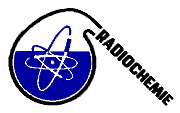Mr
Martin Precek
(Oregon State University)
19/04/2010, 10:00
Chemistry of Nuclear Fuel Cycle, Radiochemical Problems in Nuclear Waste Management
Verbal
Extraction of hexavalent and tetravalent actinides with tributylphospate (TBP) from their solutions in nitric acid is the most industrially mature process for reprocessing of spent nuclear fuel and is the basis for the development of advanced reprocessing schemes like UREX and TRUEX. One of the less resolved issues is the management of neptunium in the extraction system, because of not clearly...
Dr
Nicholas Evans
(Loughborough University)
19/04/2010, 10:15
Chemistry of Nuclear Fuel Cycle, Radiochemical Problems in Nuclear Waste Management
Verbal
The preferred option in the UK for the management of higher-activity radioactive wastes is to store it in a deep Geological Disposal Facility (GDF). This may then be backfilled with a cementitious material. Once closed, the GDF will become saturated with groundwater and highly alkaline porewater will develop with an initial pH of ca. 13.4. This will decrease to 12.5 as groundwater flow removes...
Dr
Mária LUČANÍKOVÁ
(Nuclear Research Institute plc Řež)
19/04/2010, 10:30
Chemistry of Nuclear Fuel Cycle, Radiochemical Problems in Nuclear Waste Management
Verbal
The partitioning and transmutation of long-lived nuclides such as minor actinides from high liquid waste (HLW) issued from nuclear fuel reprocessing is a method how to reduce the long-term environmental burder of HLW. In recent years, several HLW partitioning processes using different extractant agents have been developed. Among them, the tridentate ligands like N,N,N′,N′-tetraoctyl...
Dr
Mikhail Alyapyshev
(Khlopin Radium Institute RPA)
19/04/2010, 10:45
Chemistry of Nuclear Fuel Cycle, Radiochemical Problems in Nuclear Waste Management
Verbal
One of the main advantages of extraction with supercritical fluids (SCF) or liquid gases (LG) is a possibility of the reagent-free regeneration of "solvent", which sharply decreases the secondary waste volume. As a result, in last 20 years the researcher in many countries focus their attention on the supercritical fluid extraction (SFE) of the trace amounts of radioactive and heavy metals for...
Dr
Pavel Soucek
(European Commission, Joint Research Centre, Institute for Transuranium Elements (ITU))
19/04/2010, 11:00
Chemistry of Nuclear Fuel Cycle, Radiochemical Problems in Nuclear Waste Management
Verbal
An electrorefining process in molten chloride salts using solid aluminium cathodes is being developed in the Institute for Transuranium Elements to recover all actinides from metallic spent nuclear fuel. In this process, actinides are group-selectively electrodeposited on the cathode in a form of solid actinide-aluminium alloys. Fission products are anodically co-oxidised from the fuel...
Dr
Nicholas Evans
(Loughborough University)
19/04/2010, 11:15
Chemistry of Nuclear Fuel Cycle, Radiochemical Problems in Nuclear Waste Management
Verbal
The UK has an underground repository concept with a combination of engineered and natural barriers. Cementitious materials will produce high pH conditions for at least 1 Ma and surfaces for sorption which will greatly reduce the solubility of many radionuclides. Likely to be in the repository are many organic ligands, as inherent components of wastes or due to the degradation of organics, e.g....

